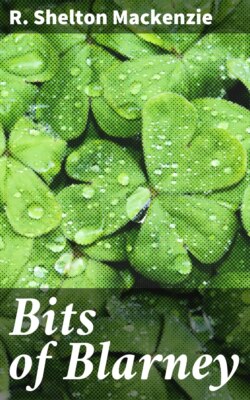Читать книгу Bits of Blarney - R. Shelton Mackenzie - Страница 12
THE BREAKS OF BALLYNASCORNEY.
ОглавлениеContemporary with Finn Mac Coul, was the renowned giant, called Ossian. There has been a question whether he were Scotch or Irish. But as Ossian certainly came all the way from Scotland to compete with Finn Mac Coul, it is not likely that they were countrymen.
That contest—it was of the description given by Ovid of what took place between Ajax and Ulysses. Go to that wild and beautiful district near Dublin, that patch of mountain scenery, so splendid and romantic, known as the Breaks of Ballynascorney and learn, as I did, what tradition now reports of the contest between Ossian and Finn Mac Coul.
A mountain road winds through these Breaks, like a huge snake. By the road-side there stands a tremendous rock of granite—perfectly isolated. Many such are to be seen scattered over the island, and the general belief is, that each column-stone marks the spot where some noted warrior had fallen in the old contests between the Irish and their Danish invaders. A different legend belongs to this rock.
The day had been beautiful—one of those brilliant days of softness and balm so prevalent in Ireland. The noontide sun may have been a little too sunny, but this could be remedied by reposing in the pleasant shadow of some of the lofty cairns which abound in that place. The day gently glided on, until, when a summer-shower made the heath glitter with its diamond drops, we sought shelter in a rustic cabin by the wayside.
No one was within, but an old woman, remarkably talkative. She paid us a world of attention—insinuated a world of compliments on the beaming beauty of the fair lady who accompanied me—would "engage that one so pretty was not without a sweetheart," and, with a smile at myself, "would not be long without a husband"—hoped that she "would be happy as the day was long, and live to see her great-grand-children at her feet,"—was certain she was an Irishwoman, "for she had the fair face, and the small hand, and the dark blue eye, and the long black lash, and the bounding step," and prophesied more good fortune than (to one of the party, at least) has yet been fulfilled.
This old woman was a good specimen of a shrewd Irish peasant. Her compliments were insinuated, rather than expressed; and, malgré the brogue, I question when more delicate flattery—pleasant, after all, to one's amour propre—could be more dexterously conveyed in the circles which we call brilliant. This tact in the matter of compliment appears intuitive.
Allusion having been made to the granite column in the neighborhood, our hostess asked whether we should like "to know all about it." The answer was in the affirmative, and then—happy to hear the tones of her own voice, proud of giving information to persons above her own station, and in pleased anticipation of a douceur—she told us a legend which, as she was rather prolix, I shall take leave to give you in my own words.
